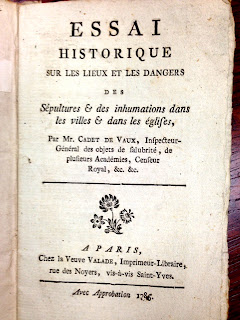Bawr, Alexandrine Sophie de, Histoires Fausses Et Vraies ... Paris: Librairie de Fournier, 1835.
"Uncommon first edition of this collection of seven stories, one of which, Le Schelling, is set in Dumfriesshire, Scotland and four others which contain female heroes’ names in the titles. Alexandrine-Sophie Goury de Champgrand, Countess Saint-Simon, baroness Bawr (1773-1860) had been married first to Saint Simon, the political theorist and founder of the eponymous utopian movement, and later to the Russian-German count Bawr, who died in 1810 in a carriage accident. She was a composer, pianist and performer of Lieder and operas, playwright, and author. With the publication of the essay Histoire de musique which appeared in the periodical Encyclopédie des dames in 1823 she became the first female historian of music."
Cadet de Vaux, Antonio Alexis. (1785). Essai historique sur les lieux et les dangers des sépultures & des inhumations dans les villes & dans les églises. Paris: chez la Veuve Valade, Imprimeur-Libraire, 1785.
"Rare first edition of this treatise by the renowned French chemist and philanthropist Antonio Cadet de Vaux, on the dangers of burial sites in towns and churches. Cadet de Vaux opens: “The dangers of tombs in churches, or in cemeteries placed at the heart of towns, has long excited the zeal of several famous doctors. Nonetheless, the abuse continues”. He discusses the traditional reasons for burials in occupied areas, and the history of the regulations surrounding the practice, before describing some of the dangers associated with burial in confined spaces. One instance he reports is the case of 149 mourners out of 170 who were the victim of a putrid fever after attending a burial at Saulieu in Burgundy, while he also notes the deaths of 15 people after the burial of a village squire near Nantes."
 Lapi, Giovanni Girolamo. Ragionamento contra la volgare opinione di non potere venire a Roma nella estate …. Roma: Stamperia di Antonio de’ Rossi, 1749.
Lapi, Giovanni Girolamo. Ragionamento contra la volgare opinione di non potere venire a Roma nella estate …. Roma: Stamperia di Antonio de’ Rossi, 1749."Rare first edition of this essay on the air of Rome and its environs, by the Roman doctor and author Giovanni Girolamo Lapi. It was common practice among those who could afford it to leave Rome during the summer, and the popular view, as Lapi notes, is that “nobody should come to Rome during the summer, if he does not wish to be at risk of becoming dangerously ill”. Lapi examines the climate, the city’s topography, the use of technologies such as aquaducts, and his observations on disease, while drawing on historical evidence from writers dating from Cicero’s time onwards, to show that Rome is perfectly healthy during summer; or at least not sufficiently hazardous to merit leaving (he does describe some of the illnesses that are common in the city, and means of treating them). Lapi also published works on the treatment of smallpox and on Roman flint."
Maria Luisa, Duchess of Parma. DISPOSIZIONE SOVRANA che prescrive delle cautele sanitarie per tener lontano il Cholera morbus. Parma, 1831.
"A very good copy of this uncommon decree, issued by Maria Luisa, Duchess of Parma, detailing the precautions taken by the city of Parma in anticipation of the cholera outbreak that was expected to arrive. The decree describes the limits on goods that could be brought in to the city, and the certification required for goods sourced from cities known to be affected by cholera, before giving directions for quarantine for travellers and for cattle, and for the disinfection of incoming mail. The final section describes the criminal penalties for those found to be contravening these regulations, and is followed by templates for health certificates for goods, travellers, and livestock."
Quintus, Teresa Bandettini, Leonardo Nardini, Francesco Rosaspina, and Angelica Kauffmann.Paralippomeni d'Omero. Modena: Dalla Società Tipografica., 1815.
"Rare first edition of this translation into Italian verse of the Posthomerica of Quintus of Smyrna, by the Tuscan poet Teresa Bandettini-Landucci. The Posthomerica is the only surviving Greek epic that gives a full narrative of the Trojan War between the Iliad and the Odyssey. The author lived, to the best of our knowledge, in the late 4th century AD, and his work covers the period after the end of the Iliad, until the end of the Trojan war, in a series of fourteen books, whose style is clearly based on that of Homer, but which also draw on the same cyclic poems as those which inspired Virgil and others. The first printed edition was produced by Aldus Manutius in 1504. The translator, Bandettini (1763-1837), was born in Lucca, and entered into the Arcadia under the name Amarilli Etrusca. A noted critic of the romantic movement, she was one of most important improvisatory poets of her time, greatly esteemed by the likes of Mascheroni, Bettinelli and Alfieri."
"First edition of this unusual study of hysteria and neurasthenia in rural populations, by the Breton physician and author Firmin Terrien. While acknowledging the popular conception that nervous diseases were “des maladies presque exclusivement urbaines”, the result of endless balls, spectacles, and other diversions, Terrien argues that despite the calm of rural life, and the lack of grand ambition in the peasant, neuropathologies are extremely common in country dwellers. This he attributes primarily to the peasant’s appetite for alcohol (5 or 6 litres of wine per day is, he claims, par for the course for a peasant of the Bocage, made worse by the fact that it is white wine), offering over forty case histories."




No comments:
Post a Comment